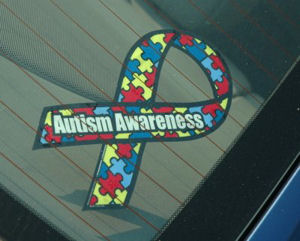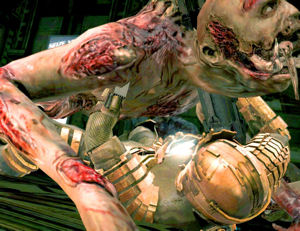11 Things I Learned in 2011
I can't complain; for the most part, 2011 has been a pretty good year. In the past, I've shied away from talking too much about what I've learned as a new parent, but today I'm going to delve straight into it. Over half of the lessons listed below have to do with parenting, but that's because, as a stay-at-home dad, parenting has been the dominating factor of my life ever since Tommy came along. With that in mind, here's what I've learned in the last twelve months:
Autism Awareness Has Gone Too Far
 | | Apparently, the best place to learn about persistent developmental disorders is on the road |
Pointing this out is no doubt going to piss some people off and earn me some frothing remarks in my comment section, but somebody has to talk about it. Yes, autism diagnoses are on the rise and early intervention is absolutely essential for autistic children. However, I want you to imagine for a minute that you are a new parent.
Children don't all develop in a predictable way, and it is inevitable that your child will not fit into a neat little pattern that can follow a long checklist of important developmental milestones. Therefore, it stands to reason that your child might have a delay in a few areas while simultaneously seeming advanced in others. Good parents will notice this and worry about it, which is perfectly normal. But nowadays, thanks to the Internet, if you, as a good parent, decide to surf around for information about how normal your child's progress is, it is also inevitable that you will be told--either directly or indirectly--that your child might be autistic and that you would be the most horrible being imaginable if you don't take your child immediately to a special neurologist.
Is your kid not saying ten words by 16 months? Does your kid walk around pigeon-toed? Does your child have an overactive imagination? Does your kid seem super smart sometimes and super slow other times? Does your child have "bad" tantrums? Does your child stare off into space sometimes? If you answered yes to any of these questions, your child might be autistic.
Here's the thing about autism, though; it's an ill-defined spectrum disorder. On one end of the spectrum are extreme autistics, children who will never be able to live a long, normal life because they are unable to function the way the rest of us do, and they are all slightly different in how their autism presents. On the other end of the spectrum are normal kids who happen to have a few eccentricities, which means that, if you try hard enough, you can force any child into the loosely defined criteria of mild autism. Now, as I said, the autism awareness movement is a good thing in helping parents deal with truly autistic children (and my heart goes out to them), but it's also scaring the shit out of a much larger group of perfectly good parents of perfectly healthy children whose only sin is being a little paranoid.
Also, as a side note, there's no big mystery about why autism diagnoses are one the rise: it's because the diagnostic spectrum has been getting wider and wider, and oh yeah, there's a huge movement out there specifically designed to find more autistic children. Let me say that again, because it seems some people refuse to get the memo: autism is not spreading like a modern epidemic, autism diagnoses are.
Parents Will Err on the Side of Caution
 | | Okay, so maybe there are games you shouldn't play around toddlers |
So obviously, that previous hypothetical was about me being a paranoid parent. There was once a time when I was laid back to a fault, not worrying about anything even as the walls of flames and screaming of innocents welled up around me. I was able to shrug off just about anything with a foolhardy confidence that life works itself out and the best response to bad things happening is to look on the bright side and move on. Then, one day, I had a child.
In Tommy's first two years of life, I worried about every bump and bruise, every developmental oddity, knowing full well that, if and when I screw up, it will affect him for the rest of his life, assuming he even survives having me for a father. But there were still things I didn't worry about, like watching violent movies or playing violent video games around him. I firmly believe, to this very day, that most children aren't badly affected by violent television, that the whole "controversy" over such things is just nonsense. It's nothing new, either; even Plato was worried about the extreme types of music and drama young people were exposed to.
Earlier this year, though, I found myself slouching on the couch with Tommy sitting on my hip while I played Grand Theft Auto III. I ran into a power-up that caused a bunch of Rastafarians to come out of the woodwork with baseball bats and start beating me within an inch of my life while I desperately tried to mow them all down with an assault rifle at close range. My son, watching this, started shouting "UH-OH! UH-OH! UH-OH!" It is likely that his brain didn't fully comprehend what he was seeing and that it didn't adversely traumatize him--especially since he acted totally normal after I shut the game off a few seconds later--but I think the episode definitely did some permanent damage to my brain. You see, for a few moments there, my beliefs and convictions were rendered utterly meaningless. Even if it's highly, ridiculously, unbelievably unlikely that violent programming will turn a child into a serial killer, it's still possible, isn't it?! So yeah, I don't play or watch anything too violent around him anymore. I even try not to say bad words, but that's pushing it.
Parents are Easily Impressed
 | | Aw, look, he knows to wear protective clothing when stupidly hurting himself! |
I don't want you to think that parenting is all one big anxiety attack, although it certainly seems like it sometimes. You see, you can be at wits' end after hours of your kid screaming, demanding, and not eating anything but crayons, but even then, when you're frazzled and frayed and trying desperately not to be angry, your child will do something completely unremarkable that will make your whole day.
For example, he could take off his shoes. This most basic of everyday functions is hardly rocket science, but the first time your child does it on his own, for some reason, causes the clouds to part, the angelic choir to sing from on high, and your heart to melt in its chest into a puddle of warm, happy goo. You will call or text your spouse and your mother and they will all squeal happily at the news. "Oh, he took off his shoes by himself!" one of them might say, "I think I'm going to shed a tear." You'll mention it on Facebook with more enthusiasm than you mustered for the death of Bin Laden, tell your neighbor about it, and then remind your spouse of it before going to bed so that you can both go to sleep with a satisfied smile.
I freely admit that my son can't do calculus yet, but I'm as proud as a father can be that he can walk upright, eat with a spoon, brush his teeth, say "Bless you" when you sneeze, and count to twenty-nine. Heck, I've even been known to talk about how smart he is, even though, by adult standards, he wouldn't even qualify as functionally retarded.
-e. magill 12/27/2011
|
|